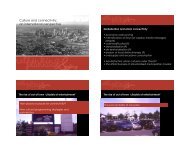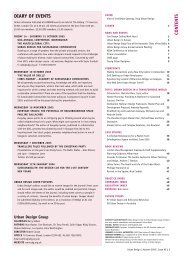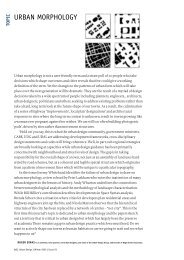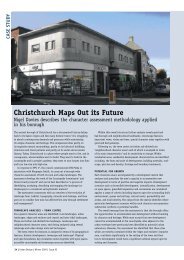CONTENTS DIARY OF EVENTS - The Urban Design Group
CONTENTS DIARY OF EVENTS - The Urban Design Group
CONTENTS DIARY OF EVENTS - The Urban Design Group
You also want an ePaper? Increase the reach of your titles
YUMPU automatically turns print PDFs into web optimized ePapers that Google loves.
Nelson - Enquiry by <strong>Design</strong><br />
JAMES HULME EXPLAINS HOW THE EBD APPROACH WORKS IN A PATHFINDER CONTEXT<br />
Nelson is one of the former mill towns<br />
of North East Lancashire, and subject<br />
to deprivation after the collapse<br />
of traditional industries left it in<br />
comparative isolation. As part of the<br />
ODPM’s Northern Way initiative, it is<br />
also one of the areas most likely to be<br />
affected by the proposals to selectively<br />
demolish surplus housing stock in the<br />
more depressed parts of Lancashire,<br />
Yorkshire and Humberside.<br />
Elevate East Lancashire is a<br />
government-funded Housing Market<br />
Renewal Pathfinder that has sought<br />
innovative solutions to the problems<br />
of low demand, negative equity, and<br />
housing market collapse in towns across<br />
East Lancashire, with an emphasis on<br />
community renewal and social cohesion.<br />
In partnership with Pendle Borough<br />
Council, English Heritage and English<br />
Partnerships, it engaged <strong>The</strong> Prince’s<br />
Foundation in an Enquiry by <strong>Design</strong><br />
(EbD) process in November 2004.<br />
OPPOSITION TO DEMOLITION<br />
A CPO scheme of demolition had<br />
been proposed for some parts of the<br />
Whitefield Ward for several years, but<br />
had met with rigorous local opposition.<br />
After considerable assessment, English<br />
Heritage has drawn attention to the<br />
area’s intrinsic value as a planned<br />
19th century industrial settlement and<br />
its survival as an unusually complete<br />
Victorian townscape, giving an<br />
indication of the issues that informed<br />
the EbD conducted by <strong>The</strong> Prince’s<br />
Foundation.<br />
THE PROCESS<br />
This is the first time that the Enquiry<br />
by <strong>Design</strong> process has been applied in<br />
a Housing Market Renewal Area, and<br />
participants in the five day workshop<br />
were drawn from all areas of the<br />
community. Residents Mohammed Iqbal<br />
and Sylvia Wilson attended throughout<br />
the process and there were numerous<br />
special meetings with community groups<br />
and those whose houses were suffering<br />
with major problems, such as damp.<br />
Pendle Borough Council staff and ward<br />
councillors were there, as were various<br />
heritage groups, and the public session<br />
on Monday 22 November was filled to<br />
capacity.<br />
EBD RECOMMENDATIONS<br />
<strong>The</strong> study found that the interests of the<br />
housing renewal programme would best<br />
be served by a selective retention and<br />
alteration of existing terraced housing<br />
stock to increase diversity of the housing<br />
offer. At the same time more mixed uses<br />
should be re-introduced in adjacent<br />
buildings, to include provision for<br />
business, leisure and community groups.<br />
As well as re-establishing a broader<br />
spectrum of activity to invigorate the<br />
area, the mix of uses will be how the<br />
specific heritage structures, such as St<br />
Mary’s Church, will have a new purpose<br />
and become new community-oriented<br />
places once again.<br />
A mill complex at the centre of<br />
Whitefield will become the focus of<br />
an Enterprise Quarter. This envisages<br />
the conversion of existing mills and<br />
weaving sheds to provide a range of<br />
accommodation for small business,<br />
creative and craft based industries.<br />
<strong>The</strong>se will provide a lively centre with<br />
employment and training opportunities<br />
as well as starter unit accommodation<br />
for emerging industries such as media<br />
and technology.<br />
Proposals for housing renewal<br />
centred on the conversion of around 60<br />
per cent of the small, terraced houses<br />
from two or three homes into one larger<br />
one. By expanding the range of house<br />
sizes on offer, and raising the standard<br />
of quality, the local housing market<br />
will gain a broader offer, enabling<br />
households with changing needs to<br />
remain in the district, and promoting<br />
community longevity.<br />
<strong>The</strong> plan is designed both to<br />
regenerate the housing stock and<br />
historic buildings, and create a<br />
sustainable community by revitalising<br />
the economic and social life of the area.<br />
In the emerging model, up to 80 per<br />
cent of the existing housing stock will be<br />
retained and adapted.<br />
Once development plans have been<br />
drawn up, Pendle Council will engage<br />
the community in a review process,<br />
and funding partners are identifying<br />
early ‘wins’ that will form the basis for<br />
Elevate’s funding strategy. Other partners<br />
support the viability of the plan by<br />
pointing to potential public and private<br />
investment of up to £20 million to get<br />
the development underway over the first<br />
five years.<br />
James Hulme, Policy Manager, Prince’s<br />
Foundation<br />
Left Focus on<br />
block conversion<br />
displaying the<br />
adaptability of<br />
the existing street<br />
pattern to offer<br />
different house<br />
sizes<br />
Below EbD master<br />
plan<br />
<strong>Urban</strong> <strong>Design</strong> | Spring 2005 | Issue 94 | 9<br />
PRINCE’S FOUNDATION







